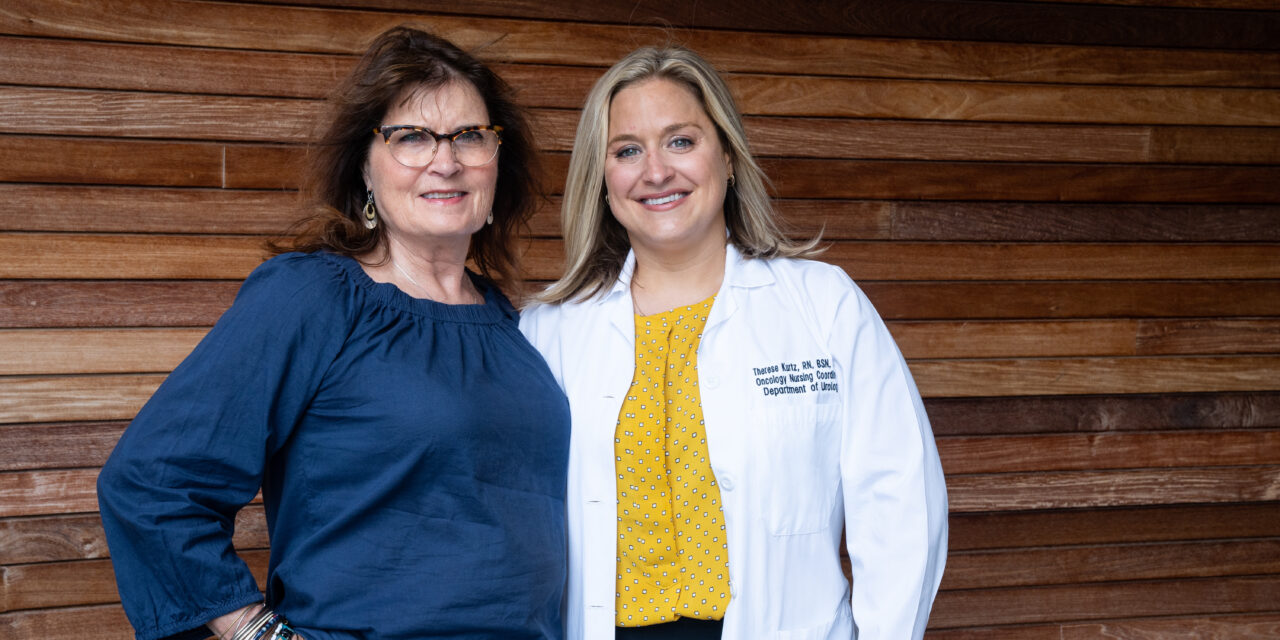Courtesy of Roswell Park Cancer Talk
When Beth Kurtz experienced the urge to frequently urinate, she saw her doctor for what she thought was a urinary tract infection (UTI). Beth overlooked and failed to mention her rust-colored urine, a symptom of bladder cancer. After ten months of using a standard UTI antibiotic and continued problems, she saw a urologist. Testing involving a cystoscopy, and a Transurethral Resection of Bladder Tumor (TURBT) to remove tumor tissue from her bladder revealed non-invasive tumors on the wall of her bladder. Beth underwent six sessions of intravesical chemotherapy directly into her bladder.
Beth remained in remission for four years before her symptoms reappeared, and she underwent another TURBT procedure with a different type of chemotherapy. Meanwhile, her daughter Therese, just 15 years old at the time of her original diagnosis, had decided to attend nursing school. When Beth’s cancer recurred a third time, Therese, who had already graduated, was working as a pediatric ICU nurse in Washington DC. Soon after accepting a position as a Genitourinary (GU) Oncology Nurse Coordinator at Roswell Park, Therese encouraged her mom to receive her care from Thomas Schwaab, MD, PhD, of Roswell Park. A fourth TURBT procedure and another round of intravesical chemotherapy led to a six-year remission, but her cancer returned as a high-grade squamous cell carcinoma. Dr. Schwaab recommended intravenous chemotherapy and a robotic radical cystectomy to remove her bladder and nearby organs.
“Therese was at most of my appointments asking questions of Drs. Khurshid Guru, Chair of Urology and Director of Robotic Surgery, and Gurkamal Chatta, Clinical Chief of Genitourinary. “My bladder, uterus, fallopian tubes, cervix, ureters, part of my colon, and 42 lymph nodes were removed, and a hole was made in my abdomen so that urine could drain into the collection bag. It was a long recovery, including nine days in the hospital and another eight weeks before I could drive. In that time, I worked with a home nurse and the GU team at Roswell Park to learn to use the urostomy bag,” said Beth.
In her role at Roswell Park, Therese has worked hard to improve the coordination of care and communication for patients undergoing difficult surgeries like her mom’s. With the help of Michelle Graton, NP of Roswell Park, Therese also started a bladder cancer patient support group. “That group has been a lifeline for me,” Beth says. “I’ve learned all kinds of things from other bladder cancer patients, including types of insurance that pay for supplies, online resources, and much more.” Michelle and Therese offer cystectomy education, a mentorship program, and a comfortable space where new and past patients communicate and learn from one another.
Despite her long journey, Beth says she has learned to live well. “I have to do some planning, but stay active, bike, walk, swim, play tennis, and enjoy vacations.” Above all, she is grateful for her faith, family, her Roswell team, and cystectomy support group who remained by her side through it all.
Learn more about bladder cancer treatment at Roswell Park, clinical trials, new technology, and watch a video at https://www.roswellpark.org/cancer/bladder/why-roswell-park. To make an appointment call 800-767-9355.












